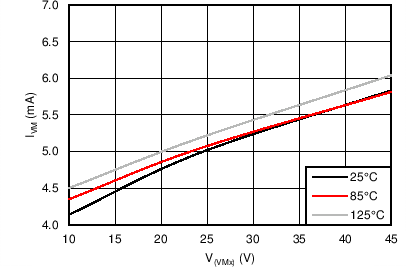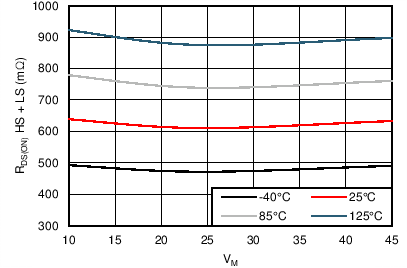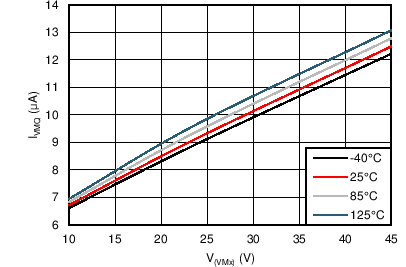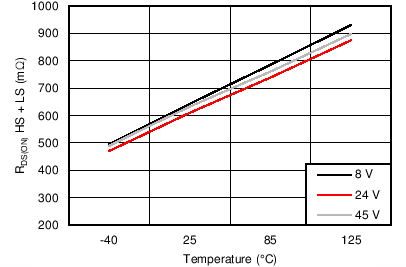SLVSA11G October 2009 – November 2015 DRV8828
PRODUCTION DATA.
- 1 Features
- 2 Applications
- 3 Description
- 4 Revision History
- 5 Pin Configuration and Functions
- 6 Specifications
- 7 Detailed Description
- 8 Application and Implementation
- 9 Power Supply Recommendations
- 10Layout
- 11Device and Documentation Support
- 12Mechanical, Packaging, and Orderable Information
Package Options
Mechanical Data (Package|Pins)
- PWP|28
Thermal pad, mechanical data (Package|Pins)
- PWP|28
Orderable Information
6 Specifications
6.1 Absolute Maximum Ratings
over operating free-air temperature range (unless otherwise noted) (1)(2)| MIN | MAX | UNIT | ||
|---|---|---|---|---|
| VM | Power supply voltage | –0.3 | 47 | V |
| Digital pin voltage | –0.5 | 7 | V | |
| VREF | Input voltage | –0.3 | 4 | V |
| ISENSE pin voltage | –0.8 | 0.8(4) | V | |
| Peak motor drive output current, t < 1 μS | Internally limited | A | ||
| Continuous motor drive output current(3) | 0 | 3 | A | |
| Continuous total power dissipation | See Thermal Information | |||
| TJ | Operating virtual junction temperature | –40 | 150 | °C |
| Tstg | Storage temperature | –60 | 150 | °C |
(1) Stresses beyond those listed under Absolute Maximum Ratings may cause permanent damage to the device. These are stress ratings only, and functional operation of the device at these or any other conditions beyond those indicated under Recommended Operating Conditions is not implied. Exposure to absolute–maximum–rated conditions for extended periods may affect device reliability.
(2) All voltage values are with respect to network ground pin.
(3) Power dissipation and thermal limits must be observed.
(4) Transients of +/- 1V for less than 25 ns are acceptable.
6.2 ESD Ratings
| VALUE | UNIT | |||
|---|---|---|---|---|
| V(ESD) | Electrostatic discharge | Human-body model (HBM), per ANSI/ESDA/JEDEC JS-001(1) | ±2000 | V |
| Charged-device model (CDM), per JEDEC specification JESD22-C101(2) | ±500 | V | ||
(1) JEDEC document JEP155 states that 500-V HBM allows safe manufacturing with a standard ESD control process.
(2) JEDEC document JEP157 states that 250-V CDM allows safe manufacturing with a standard ESD control process.
6.3 Recommended Operating Conditions
over operating free-air temperature range (unless otherwise noted)| MIN | NOM | MAX | UNIT | ||
|---|---|---|---|---|---|
| VM | Motor power supply voltage range(1) | 8.2 | 45 | V | |
| VREF | VREF input voltage(2) | 1 | 3.5 | V | |
| IV3P3 | V3P3OUT load current | 1 | mA | ||
(1) All VM pins must be connected to the same supply voltage.
(2) Operational at VREF between 0 V and 1 V, but accuracy is degraded.
6.4 Thermal Information
| THERMAL METRIC(1) | DRV8828 | UNIT | |
|---|---|---|---|
| PWP (HTSSOP) | |||
| 28 PINS | |||
| RθJA | Junction-to-ambient thermal resistance | 38.9 | °C/W |
| RθJC(top) | Junction-to-case (top) thermal resistance | 23.3 | °C/W |
| RθJB | Junction-to-board thermal resistance | 21.2 | °C/W |
| ψJT | Junction-to-top characterization parameter | 0.8 | °C/W |
| ψJB | Junction-to-board characterization parameter | 20.9 | °C/W |
| RθJC(bot) | Junction-to-case (bottom) thermal resistance | 2.6 | °C/W |
(1) For more information about traditional and new thermal metrics, see the Semiconductor and IC Package Thermal Metrics application report, SPRA953.
6.5 Electrical Characteristics
over operating free-air temperature range (unless otherwise noted)6.6 Typical Characteristics



